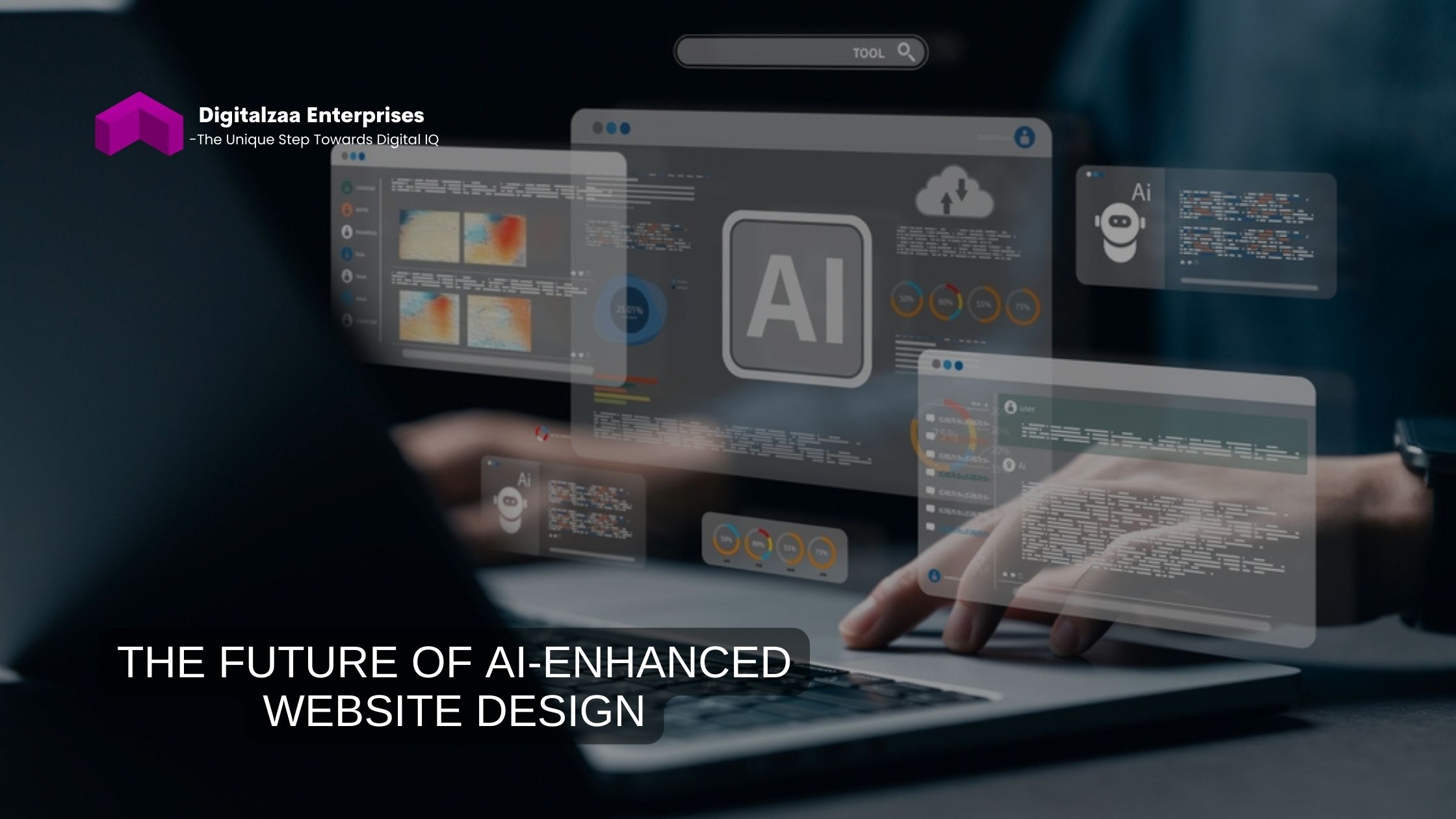Boosting Engagement and Conversions with AI-Enhanced Website Design.

In today’s digital landscape, where competition is fierce and user expectations are high, a website's design can make or break its success. Gone are the days when aesthetics alone were enough to capture attention. Modern websites must offer seamless functionality, personalized experiences, and intuitive navigation to engage visitors and convert them into loyal customers. Enter AI-enhanced website design—a game-changing approach that leverages artificial intelligence to revolutionize the user experience and drive measurable results.
Understanding AI in Website Design
Artificial intelligence (AI) in website design refers to the use of machine learning algorithms, data analysis, and automation to create smarter, more adaptive websites. AI can analyze vast amounts of user data, predict behaviors, and implement changes in real-time to enhance user engagement and boost conversions. From personalization to predictive analytics, AI tools are transforming every aspect of web design and development.
Key Features of AI-Enhanced Website Design
- Personalization AI enables websites to deliver highly personalized experiences by analyzing user preferences, behaviors, and demographics. For instance, AI algorithms can recommend products, customize content, or adjust website layouts based on individual user data. Personalized experiences not only engage visitors but also build trust and loyalty.
- Dynamic Content AI-driven tools can create dynamic content that adapts to each user’s needs. For example, an e-commerce website might display different homepage banners based on a user’s browsing history or purchasing behavior. This ensures that every visitor sees the most relevant content, increasing the likelihood of conversions.
- Chatbots and Virtual Assistants AI-powered chatbots provide instant support to users, answering queries, guiding navigation, and assisting with transactions. These virtual assistants are available 24/7, enhancing user satisfaction while reducing the workload on human support teams.
- A/B Testing and Optimization AI automates the process of A/B testing by analyzing user interactions and determining which design elements perform best. This enables continuous optimization of website layouts, calls-to-action, and other critical components.
- Voice Search Optimization With the growing popularity of voice assistants like Alexa and Siri, optimizing for voice search is crucial. AI can analyze voice search patterns and adapt website content to meet the specific needs of voice-based queries, improving accessibility and engagement.
- Predictive Analytics AI can predict user behavior by analyzing past interactions and trends. For example, it can identify when a user is likely to abandon a shopping cart and trigger targeted interventions such as personalized discounts or reminders to complete the purchase.
- Automated Design Tools AI-powered design platforms like Wix ADI or Bookmark use algorithms to create professional-quality websites automatically. These tools can generate layouts, select appropriate color schemes, and even write basic content based on user input.
Benefits of AI-Enhanced Website Design

- Improved User Engagement: AI helps create interactive and engaging websites that respond to user needs in real-time. Features like chatbots, personalized recommendations, and dynamic content ensure that visitors remain interested and engaged throughout their journey.
- Higher Conversion Rates: By analyzing user behavior and preferences, AI can optimize website elements to increase conversions. For example, AI can identify the most effective placement for call-to-action buttons or recommend upsell opportunities at the right moment.
- Enhanced Accessibility: AI makes websites more accessible to a diverse audience. Voice recognition, language translation, and adaptive interfaces cater to users with different abilities and preferences, ensuring a more inclusive user experience.
- Reduced Bounce Rates: Dynamic content and personalized experiences reduce bounce rates by providing visitors with exactly what they’re looking for. When users find relevant information quickly and effortlessly, they’re more likely to stay and explore further.
- Cost and Time Efficiency: AI automates many aspects of website design and maintenance, saving time and reducing costs. Automated testing, content generation, and user behavior analysis streamline workflows and allow businesses to focus on strategic goals.
Use Cases of AI-Enhanced Website Design
- E-Commerce AI-powered product recommendations, dynamic pricing, and personalized marketing campaigns significantly enhance the shopping experience. Tools like Shopify’s AI-driven personalization features help businesses increase sales and customer satisfaction.
- Content-Driven Websites AI helps content-driven platforms like blogs or news websites tailor their offerings to individual readers. For example, AI can suggest articles based on reading history or curate content to match trending topics.
- Portfolio and Professional Websites AI design tools enable freelancers, artists, and professionals to create visually stunning websites without needing technical expertise. Automated templates and design suggestions ensure that their portfolios stand out.
- Customer Support Platforms AI chatbots enhance customer service by providing instant, accurate responses to user queries. Businesses can use chatbots to resolve common issues, schedule appointments, and gather feedback, all while reducing operational costs.
Implementing AI in Website Design
- Define Objectives: Before integrating AI, businesses must define clear objectives. Are you aiming to improve engagement, boost sales, or enhance user support? Knowing your goals will help you choose the right AI tools and strategies.
- Choose the Right Tools: There are numerous AI tools available for website design and optimization. Some popular options include:
- ChatGPT for content creation and customer support.
- Hotjar for user behavior analytics.
- Google Optimize for A/B testing and personalization.
- Adobe Sensei for automated design and creative workflows.
- Analyze User Data: AI relies on data to function effectively. Businesses should collect and analyze user data, such as browsing patterns, click-through rates, and demographic information. This data will inform AI-driven decisions and enable continuous optimization.
- Test and Optimize: Implement AI tools gradually and monitor their performance. Use A/B testing to identify what works best, and continuously optimize based on user feedback and analytics.
- Ensure Data Privacy and Security: With AI collecting vast amounts of user data, businesses must prioritize privacy and comply with regulations like GDPR and CCPA. Implement robust security measures to protect user information and build trust.
The Future of AI-Enhanced Website Design

The future of website design is undeniably intertwined with AI. Emerging trends include:
- Hyper-Personalization As AI algorithms become more sophisticated, hyper-personalized experiences will become the norm. Websites will adapt to users in real-time, creating seamless and unique journeys.
- Augmented Reality (AR) Integration AI will enable AR experiences on websites, particularly in industries like retail and real estate. Users can virtually try on products or explore properties, enhancing engagement and decision-making.
- Advanced Voice Interfaces Voice search and navigation will become more prevalent, driven by advancements in natural language processing. Websites will need to adapt to voice-first interactions.
- Predictive Design AI will predict user needs and proactively adjust website designs. For instance, it might change layouts based on seasonal trends or user preferences.
- Autonomous Websites The concept of autonomous websites—sites that manage themselves—is on the horizon. These websites will use AI to handle updates, security, and even generate new content autonomously.
Conclusion
AI-enhanced website design is not just a trend; it’s a paradigm shift that’s redefining how businesses engage with their audiences. By leveraging AI, companies can create websites that are more interactive, personalized, and effective in achieving their goals. Whether you’re an e-commerce giant or a small business owner, integrating AI into your website design strategy can significantly boost engagement and conversions. As AI technology continues to evolve, the possibilities for innovation are limitless—making now the perfect time to embrace this transformative approach.


